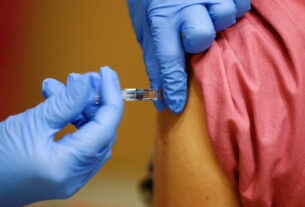Watermelon is not full of sugar, compared to other fruits. Watermelon contains 90% water, which gives it an initial advantage over other summer fruits. It restores fluids to the body that are lost in the hot summer months. 100 grams of watermelon has half the amount of carbohydrates compared to 100 grams of pear, apple, nectarine, grapes, and other fruits.
The thing about watermelon is it’s difficult to measure; a cup of watermelon cubes is equal to one serving of fruit. A cup of watermelon cubes (150 grams) has 45 calories, 11 grams of carbohydrates from simple sugar, 10 mg of lycopene and vitamin C, and a small amount of protein and fat. Most of the carbohydrates in watermelon come from simple sugar, about 50% comes from fructose, 25% from glucose, and about an additional 25% from sucrose, which means that a serving of watermelon is equal to 3 teaspoons of sugar.
In terms of the glycemic index, which ranks foods according to their effect on blood sugar levels, watermelon has a glycemic index of 76 units (compared to simple sugar which receives a rating of 100 units), meaning that it is a fruit with a relatively high glycemic index, which tends to raise blood sugar levels relatively quickly immediately after eating it. However, a combination of a high-quality fat or protein source affects the increase in blood sugar, so it is recommended to combine it with fatty cheese, for example.
For diabetics and people with high blood lipid levels, it is recommended not to exceed 2-3 servings of fruit per day, and it is also recommended to spread the fruit throughout the day and to combine a handful of almonds/walnuts or a slice of 5% cheese with the fruit.
What is so healthy about watermelon?
Watermelon contains an antioxidant called lycopene found in fruits with a red hue such as: tomatoes, papaya, and red grapefruit. Lycopene neutralizes substances that are harmful to the body, slows down the aging of skin cells and reduces the risk of cardiovascular diseases and cancer and has a positive effect on our blood pressure levels.
Studies show that lycopene and beta carotene, which is another pigment found in watermelon as well as in foods with an orange hue such as carrots, sweet potatoes, sweet potatoes, etc., help protect the skin from solar radiation and serve as a main source of vitamin A production. It is recommended to incorporate foods rich in lycopene and beta carotene into our daily routine in order to improve the skin’s ability to protect itself. In addition, studies show that these antioxidants may help prevent pancreatic, stomach, colon, breast, and prostate cancer and more.
Citrulline is an amino acid found in high amounts in watermelon. Its main function is to improve blood circulation in the body and thus helps the health of our heart and blood vessels. A high amount of citrulline is found in the watermelon rind, therefore it is recommended to eat the white part closer to the rind.
What about the watermelon seeds?
The seeds of the watermelon are also used for food and are a high-quality nutritional source of omega-3 unsaturated fatty acids. In addition, they contain good amounts of zinc and iron. Four tablespoons of peeled watermelon seeds have about a third of the recommended daily amount of zinc for women and about a quarter of the recommended amount for men.
You should take into account that most watermelon seeds come salted, so you shouldn’t consume a lot of them due to their high sodium content.
Watermelon diet: yes or no?
If you eat only watermelon, you will probably lose weight, but it is more likely that you will not be able to stick to this diet for more than a few days, since you will be hungry and your body will not receive all the nutrients it needs. This is the end of any unbalanced and extreme diet.




